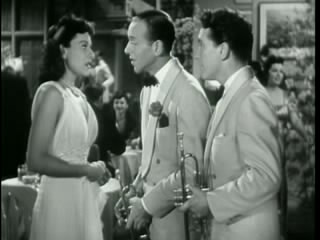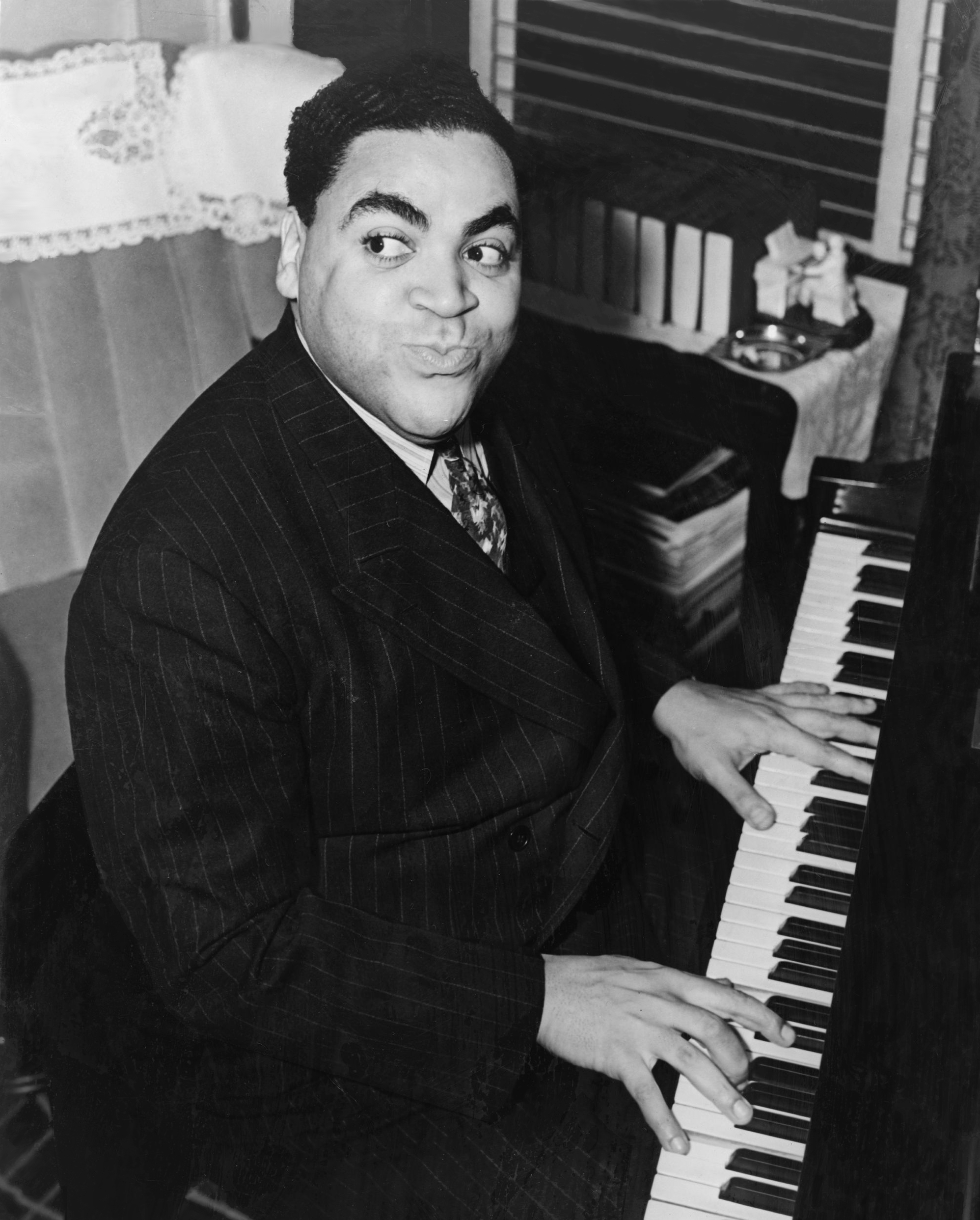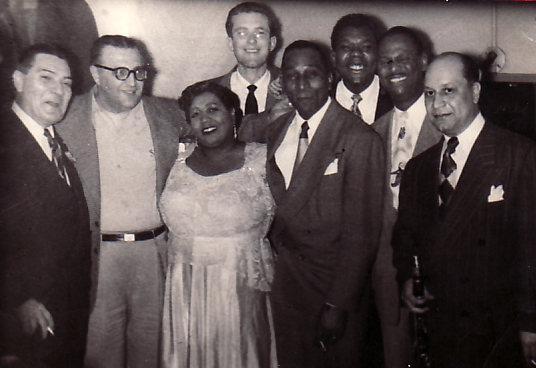|
Johnny Guarnieri
John Albert Guarnieri (March 23, 1917 – January 7, 1985) was an American jazz and stride pianist, born in New York City. Career Guarnieri joined the George Hall orchestra in 1937. He is possibly best known for his big band stints with Benny Goodman in 1939 and with Artie Shaw in 1940. Guarnieri is also noted for his embellishment and juxtaposition of jazz with classical piano, such as Scarlatti and Beethoven. Throughout the 1940s, Guarnieri was active as a sideman, recording with artists such as Charlie Christian, Cozy Cole, Ike Quebec, Charlie Kennedy, Hank D'Amico and Ben Webster. He also led his own group called the ''"Johnny Guarnieri Swing Men"'' and recorded with them on the Savoy label, a group that included Lester Young, Hank D'Amico, Billy Butterfield and Cozy Cole. He also led a trio in the 1940s composed of himself, Slam Stewart and Sammy Weiss, recording again for Savoy. During the 1940s, he also recorded for the short-lived Majestic label, playing solo pian ... [...More Info...] [...Related Items...] OR: [Wikipedia] [Google] [Baidu] |
Second Chorus
''Second Chorus'' is a 1940 Hollywood musical comedy film starring Paulette Goddard and Fred Astaire and featuring Artie Shaw, Burgess Meredith and Charles Butterworth, with music by Artie Shaw, Bernie Hanighen and Hal Borne, and lyrics by Johnny Mercer. The film was directed by H. C. Potter and produced independently for Paramount Pictures by Boris Morros, with associate producers Robert Stillman and (uncredited) Fred Astaire. The film's copyright expired in 1968 and it is now in the public domain. Plot Danny O'Neill (Fred Astaire) and Hank Taylor (Burgess Meredith) are friends and rival trumpeters with "O'Neill's Perennials", a college band. Both have managed to prolong their college careers by failing seven years in a row. At a performance, Ellen Miller (Paulette Goddard) catches both Danny's and Hank's eyes. However, she serves them a summons notice for her boss, a debt collector, but the fast-talking O'Neill and Taylor soon have her working as their manager, where her ... [...More Info...] [...Related Items...] OR: [Wikipedia] [Google] [Baidu] |
Stride (music)
Stride jazz piano, often shortened to stride, is a jazz piano style that arose from ragtime players. Prominent stride pianists include James P. Johnson, Willie "the Lion" Smith, Fats Waller, Luckey Roberts, Mrs Mills and Mary Lou Williams. Technique Stride employed left hand techniques from ragtime, wider use of the piano's range, and quick tempos. Compositions were written but were also intended to be improvised. The term "stride" comes from the idea of the pianist's left hand leaping, or "striding", across the piano. The left hand characteristically plays a four-beat pulse with a single bass note, octave, major seventh, minor seventh or major tenth interval on the first and third beats, and a chord on the second and fourth beats. Occasionally this pattern is reversed by placing the chord on the downbeat and bass notes on the upbeat. Unlike performers of the ragtime popularized by Scott Joplin, stride players' left hands span greater distances on the keyboard. Stride ... [...More Info...] [...Related Items...] OR: [Wikipedia] [Google] [Baidu] |
BBC Home Service
The BBC Home Service was a national and regional radio station that broadcast from 1939 until 1967, when it was replaced by BBC Radio 4. History 1922–1939: Interwar period Between the early 1920s and the outbreak of World War II, the BBC developed two nationwide radio stations – the National Programme and the Regional Programme (which were begun broadcasting on 9 March 1930) – as well as a basic service from London that include programming originated in six regions. Although the programme items attracting the greatest number of listeners tended to appear on the National, the two services were not streamed: they were each designed to appeal "across the board" to a single but variegated audience by offering between them and at most times of the day a choice of programme type rather than simply catering, each of them exclusively, to two distinct audiences. 1939–1945: World War II On 1 September 1939, the BBC merged the two programmes into one national service from Lon ... [...More Info...] [...Related Items...] OR: [Wikipedia] [Google] [Baidu] |
Harpsichord
A harpsichord ( it, clavicembalo; french: clavecin; german: Cembalo; es, clavecín; pt, cravo; nl, klavecimbel; pl, klawesyn) is a musical instrument played by means of a keyboard. This activates a row of levers that turn a trigger mechanism that plucks one or more strings with a small plectrum made from quill or plastic. The strings are under tension on a soundboard, which is mounted in a wooden case; the soundboard amplifies the vibrations from the strings so that the listeners can hear it. Like a pipe organ, a harpsichord may have more than one keyboard manual, and even a pedal board. Harpsichords may also have stop buttons which add or remove additional octaves. Some harpsichords may have a buff stop, which brings a strip of buff leather or other material in contact with the strings, muting their sound to simulate the sound of a plucked lute. The term denotes the whole family of similar plucked-keyboard instruments, including the smaller virginals, muselar, and spinet. ... [...More Info...] [...Related Items...] OR: [Wikipedia] [Google] [Baidu] |
Billy Butterfield
Charles William Butterfield (January 14, 1917 – March 18, 1988) was an American jazz bandleader, trumpeter, flugelhornist, and cornetist. Early years Charles William Butterfield was born in Middletown, Ohio and attended high school in Wyoming. Although he studied medicine at Transylvania College, he preferred playing in bands, and he studied cornet with Frank Simon. He discontinued his studies after finding success as a trumpeter. Career Early in his career he played in the band of Austin Wylie. He gained attention working with Bob Crosby (1937–1940), and later performed with Artie Shaw, Les Brown, and Benny Goodman. While with Bob Crosby, he initially played third trumpet behind Charlie Spivak and Yank Lawson. When those two left Crosby to join Tommy Dorsey's band in 1938, Butterfield was given the opportunity to solo on a song written by Crosby bassist Bob Haggart, initially titled "I'm Free." When lyrics were added, it became the well-known standard "What's New?". On ... [...More Info...] [...Related Items...] OR: [Wikipedia] [Google] [Baidu] |
Lester Young
Lester Willis Young (August 27, 1909 – March 15, 1959), nicknamed "Pres" or "Prez", was an American jazz tenor saxophonist and occasional clarinetist. Coming to prominence while a member of Count Basie's orchestra, Young was one of the most influential players on his instrument. In contrast to many of his hard-driving peers, Young played with a relaxed, cool tone and used sophisticated harmonies, using what one critic called "a free-floating style, wheeling and diving like a gull, banking with low, funky riffs that pleased dancers and listeners alike". Known for his hip, introverted style, he invented or popularized much of the hipster jargon which came to be associated with the music. Early life and career Lester Young was born in Woodville, Mississippi, on August 27, 1909. to Lizetta Young (née Johnson), and Willis Handy Young, originally from Louisiana. Lester had two siblings – a brother, Leonidas Raymond, known as Lee Young, who became a drummer, and a sister, Irma ... [...More Info...] [...Related Items...] OR: [Wikipedia] [Google] [Baidu] |
Ben Webster
Benjamin Francis Webster (March 27, 1909 – September 20, 1973) was an American jazz tenor saxophonist. Career Early life and career A native of Kansas City, Missouri, he studied violin, learned how to play blues on the piano from Pete Johnson, and received saxophone lessons from Budd Johnson. He played with Lester Young in the Young Family Band. He recorded with Blanche Calloway and became a member of the Bennie Moten Orchestra with Count Basie, Hot Lips Page, and Walter Page. For the rest of the 1930s, he played in bands led by Willie Bryant, Benny Carter, Cab Calloway, Fletcher Henderson, Andy Kirk (musician), Andy Kirk, and Teddy Wilson. With Ellington Webster was a soloist with the Duke Ellington Orchestra from 1940, appearing on "Cotton Tail". He considered Johnny Hodges, an alto saxophonist in the Ellington orchestra, a major influence on his playing. Gunther Schuller wrote in 1989 that Hodges influence pushed him away from his original inspiration, Coleman ... [...More Info...] [...Related Items...] OR: [Wikipedia] [Google] [Baidu] |
Hank D'Amico
Hank D'Amico (March 21, 1915 – December 2, 1965) was an American jazz clarinetist. Early life D'Amico was born in Rochester, New York, and was raised in Buffalo. Career D'Amico began playing professionally with Paul Specht's band in 1936. That same year, he joined Red Norvo. In 1938, D'Amico began radio broadcasts with his own octet, before returning briefly to Norvo's group in 1939. He played with Bob Crosby's orchestra in 1940 and 1941, then had his own big band for about a year. D'Amico had short stints in the bands of Les Brown, Benny Goodman and Norvo again, before working for CBS in New York. He also played with Miff Mole and Tommy Dorsey. D'Amico spent ten years as a staff musician for ABC, and then played with Jack Teagarden in 1954. From that point he mostly worked with small groups, infrequently forming his own band. D'Amico played at the 1964 New York World's Fair with the Morey Feld Trio. Personal life Hank D'Amico died from cancer in December 1965 in New Yo ... [...More Info...] [...Related Items...] OR: [Wikipedia] [Google] [Baidu] |
Charlie Kennedy (saxophonist)
Charles Sumner Kennedy (July 2, 1927 – April 3, 2009) was an American big band-era alto saxophonist. Early life Kennedy was born on Staten Island in New York City. Career Kennedy played with Louis Prima's big band orchestra in the 1940s. He performed a solo on that band's 1943 recording of " The White Cliffs of Dover". After a brief stint in his own band, he joined Gene Krupa's big band. Over the course of his career, he also played with Terry Gibbs's ''Dream Band'', as well as Charlie Ventura, Flip Phillips, Chico O'Farrill, and Bill Holman. In addition to live performances and recordings with big-name bands, he also was a frequent studio musician. He played in the orchestras for popular movies including ''My Fair Lady'' and ''West Side Story''. Personal life In the 1970s, for more stable income to support his family with six children, he gave up his career as a full-time musician, but continued to perform in clubs near his home in southern California. He died of ... [...More Info...] [...Related Items...] OR: [Wikipedia] [Google] [Baidu] |
Ike Quebec
Ike Abrams Quebec (August 17, 1918 – January 16, 1963) was an American jazz tenor saxophonist. He began his career in the big band era of the 1940s, then fell from prominence for a time until launching a comeback in the years before his death. Critic Alex Henderson wrote, "Though he was never an innovator, Quebec had a big, breathy sound that was distinctive and easily recognizable, and he was quite consistent when it came to down-home blues, sexy ballads, and up-tempo aggression." Biography Quebec was born in Newark, New Jersey, United States. An accomplished dancer and pianist, he switched to tenor sax as his primary instrument in his early twenties, and quickly earned a reputation as a promising player. His recording career started in 1940, with the Barons of Rhythm. Later on, he recorded or performed with Frankie Newton, Hot Lips Page, Roy Eldridge, Trummy Young, Ella Fitzgerald, Benny Carter and Coleman Hawkins. Between 1944 and 1951, he worked intermittently with Ca ... [...More Info...] [...Related Items...] OR: [Wikipedia] [Google] [Baidu] |
Cozy Cole
William Randolph "Cozy" Cole (October 17, 1909 – January 9, 1981) was an American jazz drummer who worked with Cab Calloway and Louis Armstrong among others and led his own groups. Life and career William Randolph Cole was born in East Orange, New Jersey, United States. His first music job was with Wilbur Sweatman in 1928. In 1930, he played for Jelly Roll Morton's Red Hot Peppers, recording an early drum solo on "Load of Cole". He spent 1931–33 with Blanche Calloway, 1933–34 with Benny Carter, 1935–36 with Willie Bryant, 1936–38 with Stuff Smith's small combo, and 1938–42 with Cab Calloway. In 1942, he was hired by CBS Radio music director Raymond Scott as part of network radio's first integrated orchestra. After that he played with Louis Armstrong's All Stars. Cole performed with Louis Armstrong and his All Stars with Velma Middleton singing vocals for the ninth Cavalcade of Jazz concert held at Wrigley Field in Los Angeles. The concert was produced by Leon Hef ... [...More Info...] [...Related Items...] OR: [Wikipedia] [Google] [Baidu] |
Charlie Christian
Charles Henry Christian (July 29, 1916 – March 2, 1942) was an American swing and jazz guitarist. Christian was an important early performer on the electric guitar and a key figure in the development of bebop and cool jazz. He gained national exposure as a member of the Benny Goodman Sextet and Orchestra from August 1939 to June 1941. His single-string technique, combined with amplification, helped bring the guitar out of the rhythm section and into the forefront as a solo instrument. For this, he is often credited with leading to the development of the lead guitar role in musical ensembles and bands. John Hammond and George T. Simon called Christian the best improvisational talent of the swing era. In the liner notes to the album '' Solo Flight: The Genius of Charlie Christian'' (Columbia, 1972), Gene Lees wrote that "Many critics and musicians consider that Christian was one of the founding fathers of bebop, or if not that, at least a precursor to it."Liner notes. '' ... [...More Info...] [...Related Items...] OR: [Wikipedia] [Google] [Baidu] |


.jpg)

.jpg)